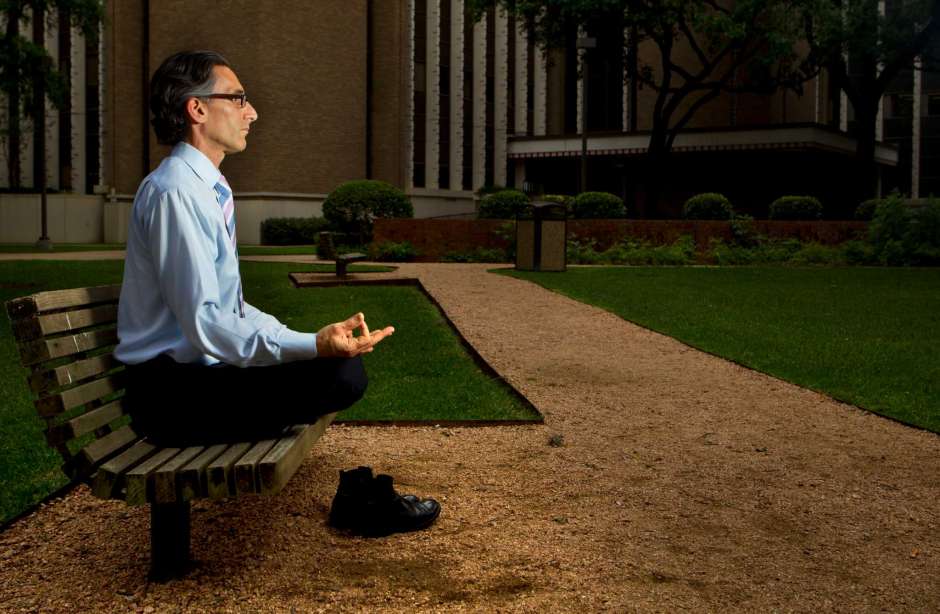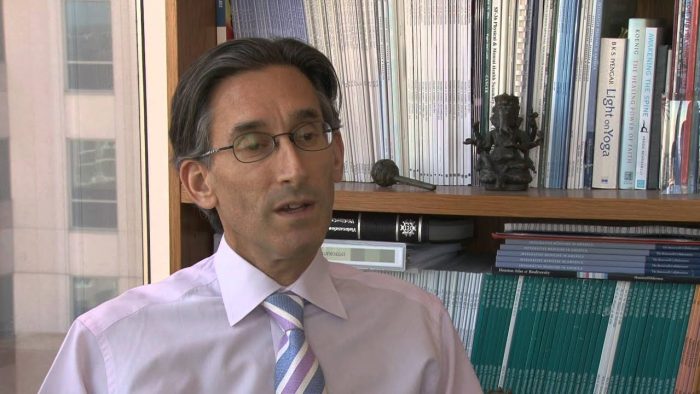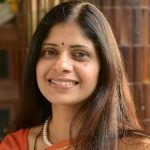Dr Lorenzo Cohen, Professor and Director of the Integrative Medicine Program at The University of Texas MD Anderson Cancer Center, and Distinguished Clinical Professor, Fudan University Cancer Hospital, Shanghai, China, conducts experiments to show how Yoga and meditation can help in the treatment of cancer.
He will be presenting a talk as part of Global Festival of Yoga 2020 on 13th, July 2020 between 7 pm and 8 pm. Please register using this link: https://indicacademy.zoom.us/webinar/register/WN_2B5HVrDrQvqThOX-rUlHDQ
Dr Cohen is conducting research to demonstrate that lifestyle changes can influence cancer outcomes. His ‘Mix of Six’ theory propounded along with co-author Allison Jefferies, points out that while most people believe that cancer attacks people randomly and that one cannot explain why someone gets it and others don’t, there are six factors which are part of the mix of cancer prevention and care.
A synergy in cancer care requires “changing your lifestyle in a number of areas makes each change more effective than it would be on its own. These same lifestyle factors interact with and reinforce each other in both positive and negative ways.” The mix of six includes – love and support, stress avoidance, sleep, exercise, diet and environment,” says the authors of the book – Anti-cancer Living.
For those who need evidence of the impact of traditional medicine and Yoga to deal with cancer, one does not need to look further than Dr Cohen’s work. He “conducts research examining the bio-behavioral effects of integrative medicine practices aimed at reducing the negative aspects of cancer treatment and improving quality of life including studies of meditation, Tibetan yoga, Patanjali-based yoga, Tai chi/Qigong, and other strategies such as stress management, emotional writing, neurofeedback, and acupuncture”.
He is interested in examining different types of complementary programs that can be easily incorporated into conventional treatment to decrease the psychophysiological consequences associated with treatment and improve outcomes.
Dr Cohen is the grandson of the late Vanda Scaravelli, author of Awakening the Spine and yoga teacher of many, herself a disciple of J Krishnamurti and Shri BKS Iyengar and Shri TKV Desikachar. In this interview, Dr Cohen speaks about his work and inspiration.
Could you share the influence of your grandmother on your choice of career?
My grandmother, Vanda Scaravelli (author of Awakening the Spine), was a big influence in my life. She started her own yoga practice in her 50s when she was spending time with J Krishnamurti and taking lessons from BKS Iyengar and TKV Desikachar. I spent every summer with her in Italy and then for a full year between undergraduate and graduate school. During this extend time with Vanda, I took daily yoga lessons learning the power and depth of this ancient practice. It was inspiring to see how she led a true yogic life. I later realized that this yogic way of life is what our cancer patients needed to reduce suffering and improve longevity. Developing strategies to educate our patients on healthful living to prevent and control cancer has been the focus of my career and a yogic way of life is the answer.
What is the role of Yoga in your personal life?
I try to have a daily formal practice that includes meditation, asana, and pranayama. But more importantly, I try and follow the tenets of a yogic life beyond the mat with a focus on what in our book Anticancer Living we call the Mix of Six - 1) harnessing the power of love, support, connection and purpose; 2) seeking to foster calm; 3) creating healthy sleep habits; 4) ensuring our bodies stay in motion; 5) consuming only foods and beverages that sustain health; and 6) decreasing exposures to environmental toxins and pollutants. By following the Mix and Six and fostering a yogic lifestyle we will improve ourselves and in time the rest of the world.
What sparked your research interests in integrated therapy for cancer?
My graduate degrees, Masters and PhD, were in medical psychology with an emphasis on the negative psychosocial and biobehavioral effects of stress on humans. Once I started to focus in cancer, it became clear I could not just study stress but needed to relieve stress. This is when I started to turn to conventional psychotherapy-based programs and integrative modalities such as yoga, meditation, expressive writing, and more. My initial focus was on the mind-body side of integrative medicine, but I quickly started to explore other modalities such as acupuncture, massage, preclinical and clinical research of natural products, and energy medicine as a way to reduce suffering and improve clinical outcomes.
What does your research show in terms of the impact of Yoga in women with breast cancer?
There are many benefits that cancer patients derive from practicing yoga. My research and that of others shows that yoga improves multiple aspects of quality of life including sleep, fatigue, pain, stress, and mental health as well as physical function, cognitive abilities, and more. We also see improved stress hormone regulation and immune function. And all of these benefits are from studies that just focus on yoga from an asana, pranayama, and meditation perspective. Imagine the outcomes when people adopt a full yogic lifestyle transforming how they eat and interact with themselves and the rest of the world.
Is it being used concurrently with radiotherapy anywhere in the US?
Many cancer centers have onsite yoga therapists or yoga teachers. However, yoga still remains something that is up to the patients to seek out for themselves and integrate into their cancer care. However, with the expanded evidence base, more and more physicians are recommending patients engage in some kind of mind-body practice. For the patients who come to our Integrative Medicine Center we recommend yoga and other mind-body practices. We look forward to the day when yoga and other mind-body practices are systematically provided to patients alongside conventional medicine and become part of the clinical pathways.
 [Image credits : Dr. Lorenzo Cohen]
[Image credits : Dr. Lorenzo Cohen]
You have researched different Yoga practices and traditional medicines. Can you describe what importance is being given to them in modern medical research in the US?
I believe we have reached a tipping point on the evidence for the utility of traditional medicines alongside conventional care. This is clearly seen in the area of mind-body practices and also in the use of some traditional herbal medicine with the WHO adopting the use of Artemisinin, a traditional Chinese medicine, for the treatment of malaria for which Dr.Youyou Tu won the Nobel Prize. There is clearly more to discover and document in this area and it is good to finally see some recognition and financial investment. However, funding for integrative medicine research is still a fraction of what is invested in more conventional areas, where the return on investment is focused more on the shareholder and less on the population as a whole. However, the evidence is clear on how to prevent the majority of chronic illnesses in our world and the solution is not in a pill or made in a factory.
Is it possible to evaluate the impact and delivery of traditional medicines and practices through Western lenses and systems? What are the pitfalls?
It is important to evaluate all medical interventions using standardized techniques. The gold standard is to use the randomized, double-blind, placebo controlled trial. However, the RCT is just one level of evidence and valuable information can be gleamed from other scientific designs including case reports, epidemiological studies, case series, and more. The pure RCT can be a challenge and will often miss some of the subtler benefits attributed to a particular modality.
In behavioral research it is also more challenging to conduct double-blind studies. However, it is also important to evaluate the safety profile of a particular treatment against the possible benefits. For example, there would be more concerns for a patient taking a potent natural product versus trying a new yoga asana series. In order to expand the acceptance of integrative medicine alongside conventional care it is important to use western research strategies and include creative assessment techniques to reveal all the benefits.
Clinical trials in cancer are happening at great costs. Do any of them involve Yoga and Ayurveda?
Although interest and investment has increased, research funding for integrative medicine, including yoga and Ayurveda, lags far behind conventional medicines. This is partly due to the lack of clear financial return on investment. However, we are starting to slowly see changes in this area as more of society seek out these practices.
What is your perception of international forums like WHO in determining the course of health care?
Having organizations like the WHO endorse and advocate for specific medicines, programs, and interventions, as well as develop practice guidelines (e.g., reduce global sugar consumption) is an important step. However, decisions are typically made at the local level, down to specific institutions, and increased efforts are needed at all levels of decision making, especially to increase reimbursement for lifestyle programs.





